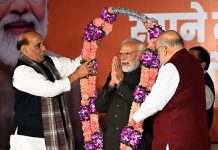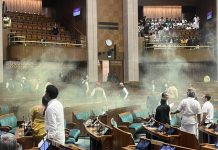 We have a situation now in which finger of suspicion is being pointed out against the Chief Justice of India himself, where his four senior-most brother judges held a press conference to speak out against his way of functioning and where charges of corruption have been levelled against a few sitting and retired high court judges.
We have a situation now in which finger of suspicion is being pointed out against the Chief Justice of India himself, where his four senior-most brother judges held a press conference to speak out against his way of functioning and where charges of corruption have been levelled against a few sitting and retired high court judges.
And even as there appears to be an internal rift within the higher judiciary, it is also at daggers drawn with the government of the day. In what is an unprecedented development, the government has returned the proposal of the collegium to appoint Justice K M Joseph, Chief Justice of the Uttarakhand High Court, as a Supreme Court judge.
The government not only returned the recommendation, it sought to underline its opposition to his appointment by accepting the recommendation for appointment of a senior lady Advocate as judge of the Supreme Court. It had perhaps never happened in the past that the government had accepted only a part of the proposals from Supreme Court collegium.
The grounds on which it did are also significant. The common belief, and very obvious to everyone concerned, was that Justice Joseph had ruled against the imposition of President’s rule in Uttarakhand in 2016 leading to restoration of the Congress government in the state. The decision came on the eve of the Assembly elections in that state and was a setback for the BJP at the Centre as well as the State. Although in the subsequent Assembly elections, BJP won with a thumping majority but apparently it had not forgotten the slight it received at the hands of Justice Joseph.
A spokesman of the BJP, pooh-poohing this as the cause of objecting to Justice Joseph’s appointment, asserted that Justice Joseph’s judgment was challenged in the Supreme Court where the then Judge J S Khehar too had endorsed the judgment of Justice Joseph and still he was elevated to the position of the Chief Justice of India. The argument, however, has few takers as not elevating Khehar could have led to several other questions and controversies.
One of the reasons given by the union law minister Ravi Shankar Prasad, which has the approval of the Hon’ble President and the Hon’ble Prime Minister, was that Justice Joseph ranked 42nd in seniority among all high court judges in the country. He, however, conveniently forgot that Justice Joseph was way ahead of other high court chief justices in the matter of seniority. In fact, the next Chief Justice of any high court in the country has lesser experience as Chief Justice by about two years as compared to Justice Joseph.
The law minister, in his communication to the CJI, also mentioned that the High Court of Kerala, to which Justice Joseph belongs, has “adequate representation in the Supreme Court”. By this, he meant that there was already another judge from the Kerala High Court while several states remained unrepresented in the apex court. This too was a fallacious argument as it is not for the Centre to decide on representation to different regions and such appointments have to be done purely on merit. Besides, there are several high courts such as Delhi and Mumbai which are much smaller but have contributed more judges to the Supreme Court. He further sought to make his point that “there is no representation of Scheduled Castes/Scheduled Tribes communities in the Supreme Court since long.”
Again what the law minister forgot was that appointments to the high court have to be made purely on merit and decided by the five senior-most judges of the Supreme Court including the Chief Justice of India. Besides, there are seven other vacancies and the names of judges to be elevated are yet to be recommended. The issue has not yet been resolved and all those concerned for the hard-earned democracy in the country would hope and pray that the crisis is resolved at the earliest.
Unfortunately, the BJP government at the Centre appears to have arraigned itself against the SC’s stand and is sitting tight over more than 60 vacancies of high court judges.
Former Chief Justice of India Justice R S Thakur broke down in public over the government not clearing so many appointments which had led to piling up of about a crore cases in higher judiciary.
Similarly, the Congress has not covered itself with glory while dealing with the judiciary. Its Ill-advised move to impeach the Chief Justice of India, which was thankfully rejected by Rajya Sabha chairman, has done much harm to the institution. The Congress knew well that impeachment is a complicated process and it does not have the strength to win the motion. Several of its own stalwarts including former prime minister Manmohan Singh and at least two former Union law ministers from the party disassociated themselves with the move to impeach the CJI. It even moved the Supreme Court itself against the rejection of its motion. The party’s stand was quite unnecessary and uncalled for. The latest reports, thankfully, indicate that the party has let the issue die down and may not pursue it.
Members of the Constituent Assembly, who drafted the constitution, deliberately set up a tough procedure for an impeachment. For any impeachment to take place, a three-fourths majority of Parliamentarians must vote in favour of the motion and there should be proven evidence of misbehaviour or corruption against the judge in question. He is also given the right to present his case in Parliament. No wonder no judge has ever been impeached since the independence.
The current CJI Dipak Misra is set to retire after a few months and an impeachment motion against him can’t even reach the preliminary stage. In any case, he is not escalating the issue. Whatever the charges against him, he has not spoken against his brother judges and has not come out in the public like them. He has, in fact, endorsed their proposal to resend the name of Justice Joseph for elevation.
The situation has perplexed the people and particularly the three crore litigants whose cases have been pending in the carious courts, particularly in subordinate judiciary, since long. The current imbroglio has certainly dented the image of the judiciary which is the last hope for the common man. It would be in the interest of all concerned, and most importantly of the democracy, that interference in each other’s domain should be strictly avoided by the constitutional institutions of democracy.
While it is given that there would be pulls and pressures from the three pillars of democracy with each trying to have a greater say, the maturity of the nation would be reflected in the three coming together to resolve issues in a more objective and sensible manner.
letters@tehelka.com













